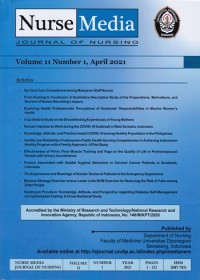
Jurnal
Validity and Reliability of Indonesian Public Health Nursing Competencies in Achieving Indonesian Healthy Program with a Family Approach: A Pilot Study
Background: Indonesia has the Indonesian Healthy Program with a Family Approach (IHP-FA) to solve various health problems in the country. The public health providers in Indonesia play a very vital role in realizing this program. There have not been clear reference standards regarding the Indonesian Public Health Nursing (IPHN) competencies. This condition causes the provision of nursing services in public health centers (PHCs) to be suboptimal.
Purpose: This study aimed to identify the validity and reliability of the core competencies of IPHN standards in a practice setting to achieve the IHP-FA.
Methods: A pilot study using a descriptive correlational study was conducted among 55 coordinators of public health nursing (PHN) program from 50 PHCs in Jember, Indonesia. The IPHN practices were accessed using the five PHN core competencies (including activities in PHCs and nursing care for follow-up patients, family, special needs group in the community, and community). The IHP-FA was measured using 12 indicators. Content Validity Index (CVI) was used to examine the validity of core competencies. Internal consistency was explored using Cronbach’ α coefficient. Construct validity using the known-groups technique was explored to measure the correlational between IPHN competencies and indicator of IHP-FA.
Results: The CVI indicated adequate content validity (0.80-0.10) and high reliability (Cronbach’s alpha coefficient=0.81). There was a significant correlation between five core IPHN competencies and achievement of IHP-FA (safe birth delivery, immunization, growth and development, management of tuberculosis, smoking, and access to clean water).
Conclusion: IPHN competencies contain valid, reliable, and psychometrically robust measures. However, some programs in IHP-FA could not be achieved with five core IPHN competencies, demonstrating the need for developing the IPHN competencies in the future.
Background: Indonesia has the Indonesian Healthy Program with a Family Approach (IHP-FA) to solve various health problems in the country. The public health providers in Indonesiaplay a very vital role in realizing this program. There have not been clear reference standards regarding the Indonesian Public Health Nursing (IPHN) competencies. This condition causes the provision of nursing services in public health centers (PHCs) to be suboptimal.
Purpose: This study aimed to identify the validity and reliability of the core competencies of IPHN standards in a practice setting to achieve the IHP-FA.
Methods: A pilot study using a descriptive correlational study was conducted among 55 coordinators of public health nursing (PHN) programfrom 50 PHCs in Jember, Indonesia. The IPHN practices were accessed using the five PHNcorecompetencies (including activities in PHCs and nursing care for follow-up patients, family, special needs group in the community, and community). The IHP-FA was measured using 12 indicators. Content Validity Index (CVI) was used to examine the validity of core competencies. Internal consistency was explored using Cronbach’α coefficient. Construct validity using the known-groups technique was explored to measure the correlational between IPHN competencies and indicator of IHP-FA.
Results: The CVI indicated adequate content validity (0.80-0.10) and high reliability (Cronbach’s alpha coefficient=0.81). There was a significant correlation between five core IPHN competencies and achievement of IHP-FA (safebirth delivery, immunization, growth and development, management of tuberculosis, smoking, and access to clean water).
Conclusion: IPHN competencies contain valid, reliable, and psychometrically robust measures. However, some programs in IHP-FA could not be achieved with five core IPHN competencies, demonstrating the need for developing the IPHN competencies in the future.
Availability
No copy data
Detail Information
- Series Title
-
Nurse Media Journal of Nursing, Vol. 11 No. 1 April 2021
- Call Number
-
(05) 610.5 DEP n
- Publisher
- Semarang : Department of Nursing, Faculty of Medicine Diponegoro University., 2021
- Collation
-
Hlm. 71-84
- Language
-
English
- ISBN/ISSN
-
2087-7811
- Classification
-
(05) 610.5 DEP n
- Content Type
-
-
- Media Type
-
-
- Carrier Type
-
-
- Edition
-
Vol. 11 No. 1 April 2021
- Subject(s)
- Specific Detail Info
-
-
- Statement of Responsibility
-
-
Other version/related
No other version available
File Attachment
Comments
You must be logged in to post a comment
 Computer Science, Information & General Works
Computer Science, Information & General Works  Philosophy & Psychology
Philosophy & Psychology  Religion
Religion  Social Sciences
Social Sciences  Language
Language  Pure Science
Pure Science  Applied Sciences
Applied Sciences  Art & Recreation
Art & Recreation  Literature
Literature  History & Geography
History & Geography